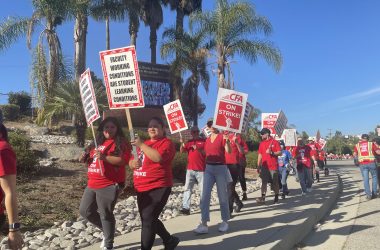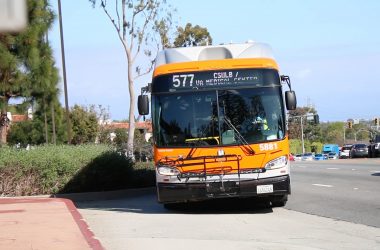Five years ago, many Californians awoke and turned on the television to see footage of planes crashing into the two towers of the World Trade Center in New York City and the Pentagon in Washington. Many have said in the past few years that what they saw and heard was some kind of elaborate practical joke, only to find out later that there was no punch line.
The Sept. 11 attacks have made a lasting impression on many students at Cal State Long Beach. An article in the Sept. 10 issue of the Los Angeles Times said 95 percent of the people polled could remember exactly what they were doing or where they were when the attacks occurred.
Undeclared freshman Lauren George said she was lying in bed when she first heard about the attacks.
“I saw the planes going into the towers and I knew it was going to be something big,” George said.
Five years later, many people on campus still see and feel the aftermath of the terrorist attacks.
“I’m Muslim and the terrorists were Muslim, so I’ve been affected. I’ve been looked at very negatively,” said freshman biology student Laila Nikaien. “I had nothing to do with it, obviously, but I’ve had many racial comments towards me. It just sucks.”
“It was definitely hard at first because I have a lot of family that lives in New York,” said freshman theater arts major Amanda Bolten. “It didn’t directly affect my family personally, but it was really hard because I had friends that I knew whose parents and whose friends were affected by it. It was really hard trying to help them cope with it.”
For CSULB President F. King Alexander, the Sept. 11 attacks occurred just one week into his former presidency at Murray State University in Murray, Ky.
“My first concern was the treatment of international students,” Alexander said. “I was hoping there wouldn’t be a national backlash against international students.”
Alexander said he saw that the negative treatment of international students was very limited in the United States and he saw a lot of tolerance toward international people in particular.
“I would say that the one area I have noticed a significant difference with students around the country is increased interest in internationalization,” he said.
Alexander said conflicts in Afghanistan, Iran and Iraq have come to the forefront both in public perspective and student involvement.
“I do believe there’s been a resurgence of political interest, as well as religious interest,” Alexander said. “Obviously, religious challenges have been at the heart of controversies for centuries, and we are not immune to [those problems] today.”
Alexander also said education broadens perspectives and that it is the critical component to solving these conflicts peacefully. He said international education is important because it helps students understand the global nature of the economy and societies.
2nd Lt. Judson White, who graduated from CSULB in 2004 and now works for the university, said that while he had always thought about serving in the armed forces, he joined the Army in February of 2002 because of the Sept. 11 attacks. White said in his graduating class of 10 people, three people have been deployed to Iraq since 2004. He also said many people, himself included, have joined the National Guard so they can support and protect in California.
“We’ve been able to see an increase in students joining ROTC in the past three to four years,” he said.
White said the military science department has had to turn away many applicants because of its high academic standards. He said the department has had to make alterations to what it teaches students because of how events in recent years have transformed the armed forces as a whole.
“The whole Army has changed and the whole concept of the fighting soldier has changed [as well],” he said, adding that one major change is the need to know how to fight in urban environments.
While the department has seen increased interest, not all of the campus has been supportive. White said that when he was a student he was verbally harassed by others on Tuesdays (when cadets wear their uniforms on campus). He said some teachers would not let him come to class when he wore his uniform and he has heard similar stories from other cadets in the program.
“I would say we’re really not very liked on campus,” White said.
Political science department Chairman Charles Noble said the Sept. 11 attacks probably had a very big role in shaping the perspectives of many students at CSULB, in particular those who were still in their early to mid-teens when the attacks occurred.
“Typically students don’t become politically aware until high school,” Noble said. “It’s fair to say this was probably one of the most important events for shaping their views of the world. Many people feel more vulnerable, easily manipulated.”
Noble said the attacks (and President George W. Bush’s response to the attacks) had a definite effect on the nation’s politics.
“I think without 9/11 Bush would have been a one-term president and we’d be dealing with issues like health care, the cost of education and economic inequality,” Noble said. “And we’d have more money to spend on them.”
Noble said that, as a response to 9/11, there has been a great growth in the interest in political science, international relations and the Middle East. He said the Bush response has polarized the nation’s politics and that people have become more interested in how their civil liberties are affected by the war.
Alexander commented on the combined impact of the one-year anniversary of Hurricane Katrina and the five-year anniversary of the Sept. 11 attacks.
“September has been kind of a benchmark,” Alexander said. “The U.S has learned a lot from the month of September about ourselves and our role in the world. Perhaps the future role we have in both is laid out before us.”



